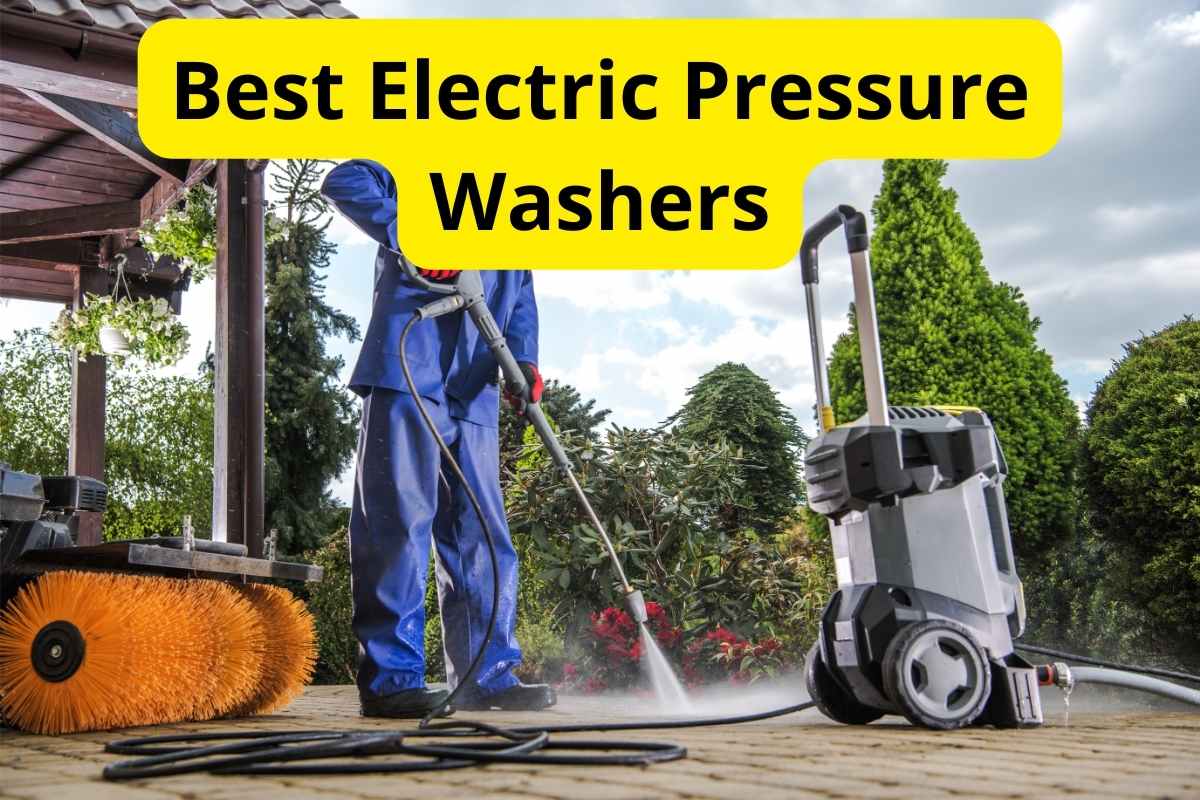
An electric pressure washer will get your driveway, walkway, sidewalk, and deck sparkling clean without all the smelly gas, messy oil, and loud noise of other pressure washers. But which is the best electric pressure washer for you and your outdoor projects?
We did the research for you. We scouted the market for the best electric pressure washers, and we also put together a detailed buyers guide covering basic pressure washer terms and buyer tips.
So how did we compare these electric pressure washers? We ranked each pressure washer in five categories and took a weighted average of each category’s score:
- Cost: 5%
- Amperage: 10%
- Hose Length: 10%
- Cleaning Power: 70%
- Power Cord Length: 5%
These 6 electric pressure washers made it to our final list. Remember: Your goal is to find the right tool for the job. Our buyers guide ought to help you get there. Happy shopping!
Top 6 Electric Pressure Washers – Reviews
1. Suyncll Pressure Washer 3800 PSI & 2.8 GPM
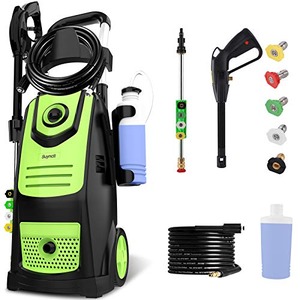
Suyncll Pressure Washer 3800 PSI & 2.8 GPM
This electric Suyncll pressure washer, our top pick, is super powerful with features that save you water and pump life.
This Suyncll pressure washer will blast off the grime on some of your most challenging projects. Equipped with 15 amps, 3800 PSI, and 2.8 GPM, this tool can masquerade as a gas-powered pressure washer –– without the smell and noise.
This Suyncll pressure washer’s soap tank is designed to release the ideal amount of suds so no soap is wasted and your pavement isn’t bubbling with excess foam.
This pressure washer shuts off automatically when the pump trigger is not engaged, saving water, energy, and pump life.
Specifications:
- PSI: 3800
- GPM: 2.8
- Amperage: 15 amps
- Hose Length: 16.5 feet
- Power Cord Length: 35 feet
Pros:
✓ Handles some heavy-duty tasks
✓ The pump shuts off when the trigger is not engaged
✓ 1-liter soap tank
✓ Soap tank designed to release the right amount of suds
✓ Five quick-connect nozzles
Cons:
✗ The 16.5-foot hose may be too short for some users
✗ Misspellings in the promotional materials may raise a yellow flag for some would-be buyers.
2. WestForce 3000 PSI & 1.85 GPM
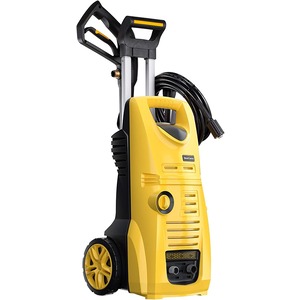
WestForce 3000 PSI & 1.85 GPM
This WestForce power washer stands out with dual water tank methods, overheating protection, and a soap nozzle.
The WestForce 3000 PSI and 1.85 GPM power washer makes cleaning your deck, pavement, or car safe and easy.
This pressure washer features overheating protections, a soap nozzle, a 200 ml detergent tank, and 0-, 15-, 25-, and 40-degree spray tips.
This WestForce pressure washer boasts two dual water tank methods. If a city water supply or water well aren’t good options, try the tool’s alternative method and run your water supply from a barrel or bucket.
Specifications:
- PSI: 3000
- GPM: 1.85
- Amperage: 14.5 amps
- Hose Length: 20 feet
- Power Cord Length: 35 feet
Pros:
✓ The pump shuts off when the trigger is not engaged, conserving energy, water, and the pump’s lifespan.
✓ 200 ml removable detergent tank
✓ Dual water tank methods: This pressure washer can use water from a bucket or barrel.
✓ Safety lock switch helps ensure no accidental startups
✓ Overheating protection
✓ 0-, 15-, 25-, and 40-degree spray nozzles, including a soap nozzle
Cons:
✗ A 200 ml detergent tank may be too small for some users.
3. WORX WG604 2240 PSI & 1.93 GPM
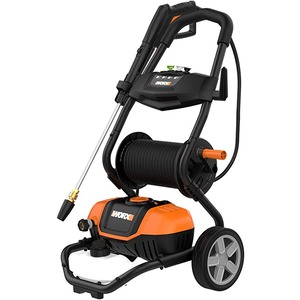
WORX WG604 2240 PSI & 1.93 GPM
The WORX WG604 is easy to use — with a rolling cart design and a hanger for the power cord.
Not only is the WORX WG604 pressure washer perfect for easy cleaning around the home, but it also has a compact, metal frame design with accessories to boot.
Special features include:
Enhanced mobility: Rolling cart design and 8-inch wheels make it easy to move the power washer from place to place.
Organization: The cart holds the hose, nozzles, soap tank, and power cord in one place so that you can have everything at your fingertips.
Tangle-free hose: The cart’s rolling reel helps keep the 25-foot hose kink and knot-free.
No cord chaos: Use the built-in hanger to keep the power cord out of your work path.
Specifications:
- PSI: 2240
- GPM: 1.93
- Amperage: 13 amps
- Hose Length: 25 feet
- Power Cord Length: 35 feet
Pros:
✓ Adjustable soap flow knob
✓ Handles medium-duty tasks
✓ 42 oz soap tank
✓ 40-degree, 25-degree, and turbo nozzle
✓ Soap nozzle
✓ The durable metal frame holds all features in one place
✓ Cart design makes pulling or pushing the machine hassle-free
✓ The cart design has a soft-grip handle
✓ The cart has a power cord hanger
✓ Rolling reel winds and unwinds the hose to keep it tangle-free
✓ 25-foot hose
Cons:
✗ Not suitable for heavy-duty work
4. Sun Joe SPX2003 2000 PSI & 1.8 GPM
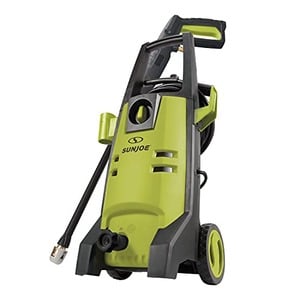
Sun Joe SPX2003 2000 PSI & 1.8 GPM
The electric Sun Joe SPX2003 is simple to maneuver and lightweight. Also, the pump shuts off when the trigger is not in use.
The Sun Joe SPX2003 pressure washer, with its 2000 PSI and 1.8 GPM, will have your landscape glistening in no time.
This electric pressure washer is lightweight and easy to maneuver, weighing in at only 17 pounds. With a 20-foot hose and 35-foot power cord, you’ll be able to move about your workspace with ease.
Specifications:
- PSI: 2000
- GPM: 1.8
- Amperage: 13 amps
- Hose Length: 20 feet
- Power Cord Length: 35 feet
Pros:
✓ 0-, 15-, and 40- degree nozzles
✓ Lightweight design
✓ The pump automatically shuts off when the trigger is not enabled
Cons:
✗ It does not have a 25-degree nozzle
5. Sun Joe SPX3000 2030 PSI & 1.76 GPM
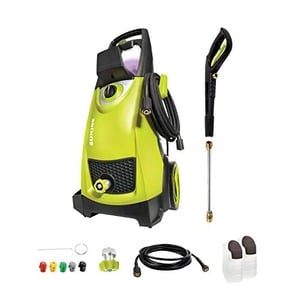
Sun Joe SPX3000 2030 PSI & 1.76 GPM
The electric Sun Joe SPX3000 is a favorite of Amazon customers with tens of thousands giving it 4.5 of 5 stars.
Let the Sun Joe SPX3000 pressure washer do the dirty work for you. Users can’t get enough of the Sun Joe SPX3000, with nearly 30,000 (and counting) reviews giving this 2030 PSI electric pressure washer an average 4.5-star rating on Amazon.
Need to clean your car and pool deck? There’s no need to choose between the two. The Sun Joe SPX3000 shows off not one but two 0.9-liter detergent tanks. Fill one with car soap and another with a pool deck cleaner and get two jobs done quickly and easily.
Specifications:
- PSI: 2030
- GPM: 1.76
- Amperage: 14.5 amps
- Hose Length: 20 feet
- Power Cord Length: 35 feet
Pros:
✓ Nearly 30,000 (and counting) reviews on Amazon
✓ Equipped with two 0.9-liter detergent tanks to store different types of cleaning detergents
✓ Total Stop System shuts off the pump when the trigger is no engaged
✓ 0-, 15-, 25-, and 40-degree nozzles
✓ Soap nozzles
✓ Safety lock switch helps prevent accidental startups
Cons:
✗ Some users report the machine has a short lifespan
6. Westinghouse 2030 PSI & 1.76 GPM
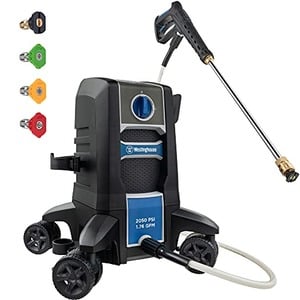
Westinghouse 2030 PSI & 1.76 GPM
Westinghouse 2030 PSI is our versatility champ. The locking wheels and anti-tipping technology are just two special features.
If machine mobility is a priority, your eyes ought to be on this Westinghouse pressure washer. This robust electric pressure washer tackles light to medium jobs and has 360-degree lockable wheels for maximized mobility.
And you won’t need to stop your work every time the tool rolls from concrete to grass –– this pressure washer’s anti-tipping design makes rolling between surfaces a breeze. No more falling pressure washers!
This pressure washer also features an easy-coil nylon-braided hose, 20-oz soap tank, and four cleaning nozzles.
Specifications:
- PSI: 2030
- GPM: 1.76
- Amperage: 13 amps
- Hose Length: 15 feet
- Power Cord Length: 35 feet
Pros:
✓ 360-degree lockable wheels for maximized mobility
✓ Easy-coil nylon-braided hose
✓ Anti-tipping technology
✓ 20-oz soap tank
✓ 0-, 15-, and 25-degree nozzles
✓ Soap nozzle
✓ Handles light to medium cleaning tasks
✓ Pump stops when trigger not engaged
Cons:
✗ Does not have a 40-degree nozzle
✗ 15-foot hose may not be long enough for some users
Buyers Guide
Before tapping your credit card to pay for a new electric pressure washer, check out our buyer tips below. You don’t want to buy a pressure washer that’s too weak for the job or pay extra for cleaning power you don’t need. The best kind of shopping is smart shopping.
Let’s review the basics:
PSI and GPM
PSI and GPM are two numbers you’re likely to see the most when shopping for a new pressure washer. PSI and GPM help you measure a tool’s cleaning power and whether it can handle light, medium, or heavy-duty work.
What is PSI?
PSI stands for pounds per square inch. It measures water pressure. If a pressure washer has a 3500 PSI, that means it applies a maximum of 3,500 pounds per square inch against the surface you’re cleaning.
What is GPM?
GPM means gallons per minute. GPM measures water flow. The higher the GPM, the faster the pressure washer can clean a dirty surface and wash away debris.
If a pressure washer has 2 GPM, its flow rate is 2 gallons of water per minute.
How to Calculate Cleaning Power:
Need to compare the cleaning power of two different pressure washers? Here’s a simple way to do it: Multiply a pressure washer’s PSI by its GPM (PSI x GPM). This calculation results in a cleaning power unit you can easily compare.
PSI Levels
Required PSI levels vary among tasks. Need to blast the mildew off your back deck? A 1500 PSI pressure washer might be too weak for the job.
Need to clean your car with a 2800 PSI pressure washer? Make sure you use the right nozzle to enable low pressure. Otherwise, your vehicle will need a new paint job.
And if you’re planning to do only light-duty chores around the house, there’s no need to pay extra for higher pressure you don’t need.
The Pressure Washer Manufacturers’ Association breaks down appropriate PSI levels into three categories:
Best for Light-Duty Work
- Up to 1900 PSI
- Between 1.1 GPM and 1.4 GPM
Some examples of light-duty pressure-washing work:
- Patio furniture
- Grills
- Cars
- Walkways
- Boats
- Windows
- Dirt bikes
Best for Medium-Duty Work
- Between 1900 PSI and 2800 PSI
- Between 1.8 GPM and 2.5 GPM
Some examples of medium-duty pressure-washing projects:
- Driveways
- Sidewalks
- Siding
- Paint prep
Best for Heavy-Duty Work
- 2800 PSI or more
- 2.5 GPM or more
Some examples of surfaces needing heavy-duty pressure washing:
- Decks
- Patios
- Oil stains
- To remove rust, paint, or graffiti.
Pro Tip: Always use the appropriate PSI for the task at hand. You risk damaging some surfaces with those higher PSI levels.
Power Source
Pressure washers can have one of three power sources: gas, corded electric, and battery. Users often find that each power source meets their needs in different ways.
The question to ask yourself: Which surfaces do you plan to pressure wash and which power source meets those needs the best?
Gas-powered:
Pros:
✓ Typically have more cleaning power than corded electric and battery-powered pressure washers.
✓ Best for commercial or heavy-duty jobs
✓ User mobility
Cons:
✗ Often heavier, noisier, and more expensive than corded electric and battery-powered pressure washers.
✗ Can be challenging to maintain gas-powered pressure washers.
✗ Can be difficult to start.
✗ Emits harmful exhaust fumes.
✗ Gasoline can make the machine and your working area smell bad.
Corded electric:
Pros:
✓ Typically lighter, quieter, and more affordable than gas-powered pressure washers
✓ Easy to start
✓ Eco-friendly alternative to gas-powered pressure washers
✓ Unlimited run time (as long as the motor doesn’t overheat)
Cons:
✗ The power cord may restrict user mobility.
✗ The workspace must be near an available outlet.
✗ May not have the same cleaning power as a gas-powered pressure washer.
Battery:
Pros:
✓ Typically lighter, quieter, and more affordable than gas-powered pressure washers.
✓ User mobility. No restricting power cords.
✓ Easy to start
✓ Eco-friendly alternative to gas-powered pressure washers.
Cons:
✗ Limited run time. When the battery runs out of juice, your pressure washer needs recharging.
✗ May not have the same cleaning power as a gas-powered pressure washer.
Pump
If you’re interested in buying a gas-powered pressure washer, you’ll want to consider the pump. Here are the two most common pumps and their advantages:
Axial
Axial pumps are best for homeowners taking care of small jobs around the your house and yard. This pump requires little maintenance while still getting the job done.
Triplex
Need your pressure washer for frequent commercial-level work or demanding jobs? You may want a triplex pump. A pressure washer with a triplex pump requires more maintenance and costs more, but the triplex pump ensures your tool will last longer and will operate more efficiently than an axial pump.
Amperage
Amperage is the strength of an electric current in amperes, written amps for short. Amps help measure the maximum time a motor can run continuously without exceeding its temperature limits.
When running your corded electric pressure washer, the last thing you want is for the tool to overheat and shut off. The more amps your pressure washer has, the better it is at cooling itself down when the work gets tough.
Hose Length
A few more feet may have been all you needed to wash down that corner of the sidewalk. Extend your reach with a pressure washer with a longer hose.
With a corded electric pressure washer, an extra few feet can make all the difference when the power cord restricts you.
Using a gas-model or battery-powered pressure washer? A longer hose means you don’t need to lug the machine around behind you as much. And remember, gas pressure washers often weigh more than 100 pounds.
Power Cord Length
Just like the hose length, an electric pressure washer’s power cord will define your working space. Check the tool’s power cord length and ensure it meets your needs.
Wheel Size
Wheels enable portability. The bigger your pressure washer’s wheel size, the easier it is to maneuver the machine around rugged terrain.
Water Source
Your pressure washer won’t magically make water. Before buying your pressure washer, you should know what water source you’re going to use.
You need a water source that can provide the appropriate GPM. If your pressure washer operates with a 3 GPM, you need to use a water source that can provide 3 gallons of water per minute.
A water well’s limited supply sometimes won’t cut it. A city water supply may be a more reliable choice.
Don’t have a good water source? Consider adding a water tank to your purchase that you can hook up to your pressure washer. Some pressure washers even come with a built-in water reservoir you can refill in the bathroom sink.
Pro Tip: You may need to add a garden hose to your order if you don’t have one already. A garden hose will connect the water source to your pressure washer.
Detergent
Some pressure washers come with a built-in detergent tank for added cleaning power. A detergent tank is handy if you plan to wash your car with the pressure washer.
Always check the instruction manual before using your power washer with a cleaning aid.
Nozzle Tips
Your pressure washer should come with various wand nozzles that control the angle, spray pattern, and focused water stream intensity. Depending on the surface you’re cleaning, you’ll want to adjust the water stream’s intensity by changing the nozzle.
Here’s why: If you don’t use the appropriate nozzle, you risk damaging the surface you’re trying to clean.
Your pressure washer’s nozzles will either be color-coded interchangeable spray tips or an all-in-one adjustable nozzle.
Noise
Don’t forget about the neighbors and the noise from your pressure washer. They probably won’t be happy if your new machine is causing a stir.
Ensure your pressure washer’s decibel rating (dBA) is appropriate for local laws. Many counties and cities have ordinances in place to limit noise pollution.
Potential Risks
Pressure washers can cause serious injury if not used safely. If you’re not confident in your ability to operate this tool, consider leaving it on the store shelf and contacting a local professional near you to do the cleaning for you.
FAQ About Pressure Washers
A power washer and pressure washer are two different tools with one key difference. Both use pressurized water to remove tough grime from surfaces. But only a power washer heats the water. A pressure washer only uses cold water.
Hot water can damage some surfaces. Never assume that you can use a power washer on the same surface you used a pressure washer.
Always operate a pressure washer safely and correctly. Otherwise, you risk causing serious injury to yourself, others, or the surface you are cleaning.
Follow this checklist to operate your pressure washer safely:
— Avoid using the 0-degree nozzle. This nozzle channels the stream’s intensity into one single point, making it dangerous to use.
— Use the appropriate nozzles for the surface you are cleaning.
— Be aware of your surroundings as you use your pressure washer.
— Read and follow the instruction manual.
— Always wear safety goggles, gloves, long pants, and hearing protection.
— Check electrical cords before use to avoid shock.
— Check the user manual before plugging an electric pressure washer into an extension cord.
— Never aim the spray wand at another person.
— Never clean a surface with a PSI that is too high.
— Never operate a gas-powered pressure washer in an enclosed space.
— Never operate a pressure washer while on a ladder.
When to Call a Pro Pressure Washer
Worried about operating your pressure washer safely? Concerned you may damage your car, driveway, or siding? Leave the pressure of wielding a pressure washer to the professionals.
Call a pressure washing professional near you to take the worry off your hands so you can get back to those relaxing weekends (and save a finger or two).
LawnStarter participates in the Amazon Services LLC Associates Program and other retailer affiliate programs. LawnStarter may earn revenue from products promoted in this article.
Main Image Credit: welcomia / Canva Pro / License wih Text Overlay using Canva Pro
![10 Best Pressure Washers of 2025 [Reviews] man pressure washing his garden with text overlay on it](https://www.lawnstarter.com/blog/wp-content/uploads/2021/02/Best-Pressure-Washers.jpg)
![10 Best Gas Pressure Washers of 2025 [Reviews] pressure washer with white background with text overlay on it](https://www.lawnstarter.com/blog/wp-content/uploads/2021/07/Best-Gas-Pressure-Washers.jpg)
![4 Best Cordless Pressure Washers of 2025 [Reviews] pressure washer cleaning in a yard with text overlay on it](https://www.lawnstarter.com/blog/wp-content/uploads/2021/11/Best-Cordless-Pressure-Washers.jpg)
![7 Best Gas Lawn Mowers of 2025 [Reviews] person usiing lawn mower with text overlay on it](https://www.lawnstarter.com/blog/wp-content/uploads/2021/07/Best-Gas-Lawn-Mowers.jpg)
![10 Best Gas Leaf Blowers of 2025 [Reviews] worker cleaning leaves with a blower with text overlay on it](https://www.lawnstarter.com/blog/wp-content/uploads/2023/10/Best-Gas-Leaf-Blowers.jpg)